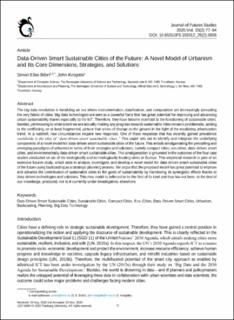| dc.description.abstract | The big data revolution is heralding an era where instrumentation, datafication, and computation are increasingly pervading the very fabric of cities. Big data technologies are seen as a powerful force that has great potential for improving and advancing urban sustainability thanks especially to the IoT. Therefore, they have become essential to the functioning of sustainable cities. Besides, yet knowing to what extent we are actually making any progress towards sustainable cities remains problematic, adding to the conflicting, or at least fragmented, picture that arises of change on the ground in the light of the escalating urbanization trend. In a nutshell, new circumstances require new responses. One of these responses that has recently gained prevalence worldwide is the idea of “data-driven smart sustainable cities.” This paper sets out to identify and integrate the underlying components of a novel model for data-driven smart sustainable cities of the future. This entails amalgamating the prevailing and emerging paradigms of urbanism in terms of their strategies and solutions, namely compact cities, eco-cities, data–driven smart cities, and environmentally data-driven smart sustainable cities. This amalgamation is grounded in the outcomes of the four case studies conducted on six of the ecologically and technologically leading cities in Europe. This empirical research is part of an extensive futures study, which aims to analyze, investigate, and develop a novel model for data-driven smart sustainable cities of the future using backcasting as a strategic planning process. We argue that the proposed model has great potential to improve and advance the contribution of sustainable cities to the goals of sustainability by harnessing its synergistic effects thanks to data-driven technologies and solutions. This new model is believed to be the first of its kind and thus has not been, to the best of our knowledge, produced, nor is it currently under investigation, elsewhere. | en_US |
